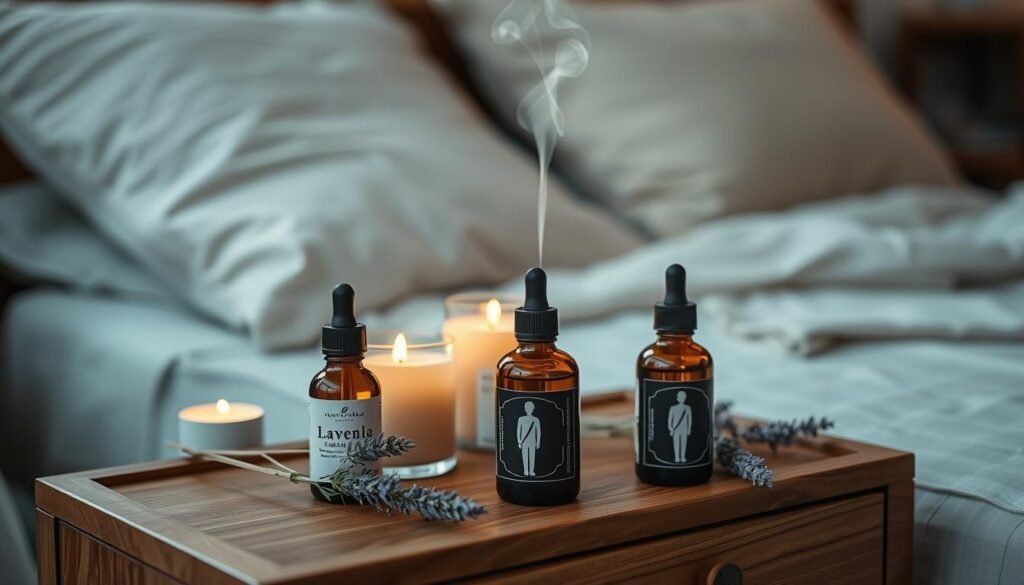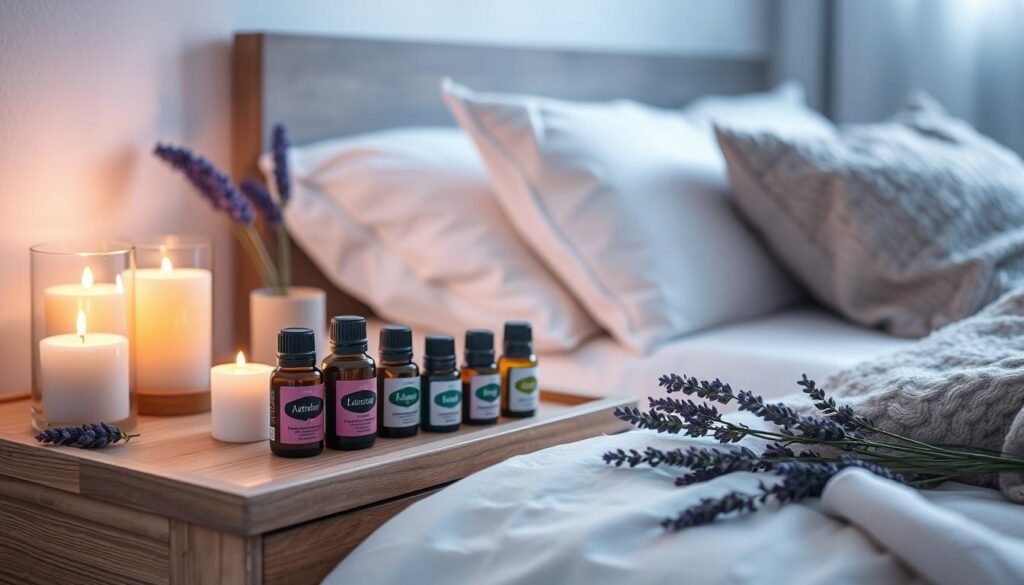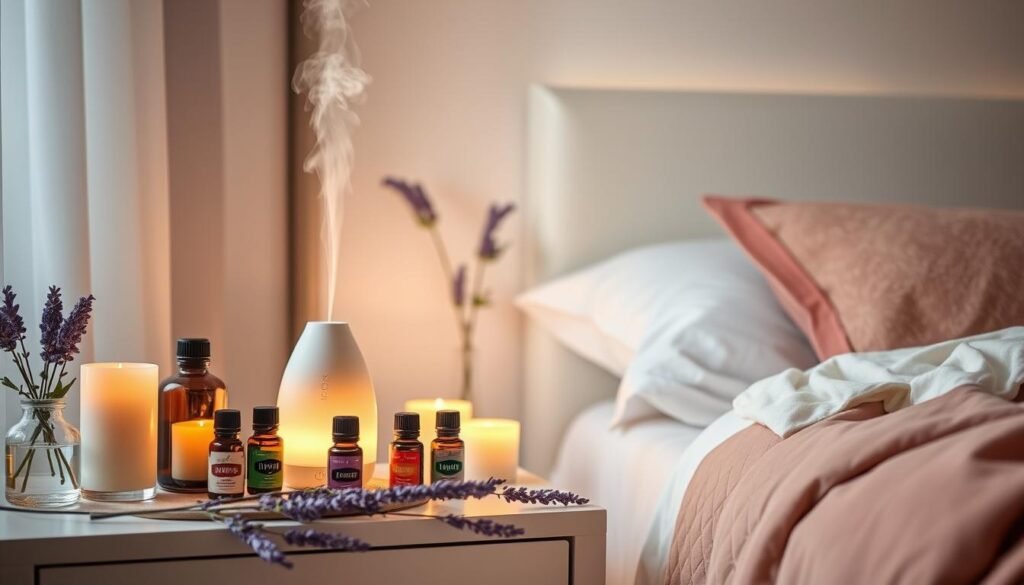About 70 million Americans are fighting insomnia. This shows how big the issue really is, affecting daily lives and well-being. Luckily, many are looking to natural remedies for help. Essential oils are leading the way. They encourage relaxation and can improve how well we sleep. This makes them a great natural option for those looking for help with sleep.
Studies show that oils like lavender and chamomile can help you fall asleep faster and sleep longer. Lavender oil, for example, is great for restful sleep. This is why it’s a top choice for battling insomnia. As people learn more about these natural solutions, they see how well aromatherapy works for sleep issues. Essential oils help by easing stress and anxiety, making for a peaceful night, which leads to better health.
To find out more about how these oils help with better sleep, visit this resource.
Key Takeaways
- Essential oils are a popular choice for those looking for insomnia relief.
- Lavender and chamomile oils are top picks for improving sleep quality.
- Natural sleep aids like essential oils can lessen stress and anxiety, helping you relax.
- Using essential oils in various ways can make them more effective.
- Knowing the unique benefits of each oil can help you find the best sleep solution.
Understanding Insomnia and Its Impact
Insomnia is a common sleep issue that hits around 33% of people at some point. It makes falling asleep, staying asleep, or waking up too early difficult. Various factors like stress, anxiety, and certain lifestyle habits can cause insomnia. It can turn into a long-term problem and is often linked with other health issues or medications.
The impact of insomnia on one’s mental and physical health is huge. It leads to poorer brain function, more anxiety, and a higher risk of sickness. Not getting enough sleep can make you feel down and less satisfied with life. It shows why it’s crucial to tackle this problem. People often look to essential oils as a way to fight insomnia and get better sleep.
For those dealing with insomnia, exploring essential oil options might help. Essential oils help calm the nerves, ease anxiety, and encourage relaxation. They play a key role in managing insomnia.
The health risks of insomnia are a major worry for many. Without proper help, insomnia can lead to more health issues. Finding and fixing the root cause is key to effective treatment. Paying attention to sleep hygiene and getting assessments is important in overcoming sleep challenges.
It’s important to understand insomnia deeply to find the best ways to treat it. Looking at how lifestyle changes, therapies, and sleep health are connected helps. This emphasizes the importance of comprehensive approaches in dealing with insomnia. Learning about related sleep disorders, like hypersomnia, can provide more insights into sleep health.
| Aspect | Details |
|---|---|
| Prevalence | Affects approximately 33% of individuals at various points in their lives |
| Chronic Cases | Can last for months; often linked with other medical issues |
| Common Symptoms | Difficulty falling asleep, staying asleep, waking too early |
| Impact on Health | Decreased cognitive function, increased anxiety, chronic health conditions |
What Are Essential Oils?
Essential oils come from various plant parts like flowers and roots. They are defined as essential because they carry the scent and qualities of the plant. They’re used in aromatherapy for their health benefits because they’re so powerful.
Some main benefits of essential oils include better sleep, less stress, and more relaxation. For example, lavender oil can help you sleep better by making a peaceful space. A study in 2005 showed it helps increase deep sleep, proving its efficiency.
There are many plant-based oils like clary sage that help relaxation through diffusion. A study in 2013 found women felt more relaxed around this scent. You can mix essential oils with carrier oils. Use 1 teaspoon of carrier oil for each drop of essential oil.
Using these oils daily can boost your health and improve sleep habits. Aromatherapy offers many natural options for those looking for better sleep.
| Essential Oil | Price | Primary Benefits |
|---|---|---|
| Lavender | $31.95 | Calming, sleep aid |
| Clary Sage | $35.95 | Relaxation, stress relief |
| Cedarwood | $8.37 (discounted) | Calming, grounding |
| German Chamomile | $35.95 | Anti-anxiety, sleep aid |
| Roman Chamomile | $31.95 | Calming, anti-anxiety |
| Rose | $199.95 | Emotional balance, stress relief |
How Do Essential Oils Help with Sleep?
Essential oils help you sleep better by relaxing your body and mind. Studies show they really improve sleep quality. One review in 2014 looked at 15 studies. It found that essential oils help most people sleep better.
When you inhale essential oils, your brain makes serotonin and endorphins. These chemicals help you sleep. The process also calms you down, thanks to the parasympathetic nervous system. Lavender essential oil is especially good for deeper sleep, studies say.
In 2017, research confirmed essential oils make you feel more relaxed at bedtime. A mix of chamomile, lavender, and neroli oils lowers stress and anxiety. This can help you fall asleep easier, especially if you’re stressed.
Essential oils also help by lowering your heart rate and blood pressure. This makes your sleep environment more peaceful. Clary sage oil, for example, can lower blood pressure well, helping you ease into sleep.

Using oils like valerian root regularly can make your sleep better, says a 2020 study. They make bedtime smoother by reducing disturbances. The science shows essential oils affect your brain. They change how you react emotionally and process senses, leading to better sleep.
As we learn more, the benefits of aromatherapy with essential oils become clearer. They’re proving to be powerful aides for restful sleep.
The Best Essential Oils for Insomnia
Looking into essential oils could be your key to sleeping better if you have insomnia. The top essential oils for insomnia have calming and healing features. They’re perfect for helping you relax. Let’s dive into the most helpful oils for better sleep:
Lavender Essential Oil
Lavender oil is known for its soothing capabilities that lessen stress and help you sleep well. Research finds it can boost sleep quality over time. Its calming scent aids in relaxation, making it a top pick for insomnia.
Chamomile Essential Oil
Chamomile oil is famous for its gentle calming effects. It’s good for reducing stress and helps calm your mind and body, aiding sleep. Many enjoy chamomile tea for relaxation, and its oil form can further promote a restful night.
Bergamot Essential Oil
Bergamot oil smells like fresh citrus and has calming properties. Studies show it works well when mixed with other oils to improve sleep. Its ability to lessen stress helps in creating a peaceful sleep setting.
Ylang-Ylang Essential Oil
Ylang-ylang oil has a lovely floral scent that helps slow your heart rate and calm nerves. It’s great for those whose insomnia stems from stress or anxiety. This oil helps in making a calm environment needed for good sleep.
Clary Sage Essential Oil
Clary Sage oil is great for relaxation and balancing your emotions. It helps lower stress and anxiety, which can better your sleep patterns. Many use this oil in the evening to smoothly transition into sleep.
Valerian Essential Oil
Valerian oil is a known sleep helper for its calming qualities. It has compounds that might help you fall asleep faster. It’s a favorite for those looking for effective insomnia-fighting essential oils.
Frankincense Essential Oil
Frankincense oil is not just known for its scent but also its calming effects. It helps in cutting down stress, contributing to a restful sleep setup. Using frankincense at night could improve your sleep quality.
Cedarwood Essential Oil
Cedarwood oil with its grounding aroma fosters relaxation. It supports melatonin production, vital for a good sleep cycle. Adding cedarwood oil into your routine could help with deeper and more refreshing sleep.

| Essential Oil | Benefits |
|---|---|
| Lavender | Reduces anxiety, improves sleep quality |
| Chamomile | Promotes relaxation, mild sedative |
| Bergamot | Reduces stress, improves sleep quality |
| Ylang-Ylang | Calms nerves, lowers heart rate |
| Clary Sage | Balances emotions, reduces stress |
| Valerian | Encourages relaxation, shortens sleep time |
| Frankincense | Reduces stress, enhances sleep experience |
| Cedarwood | Promotes melatonin production, supports deep sleep |
Methods to Use Essential Oils for Better Sleep
There are many ways to use essential oils to improve sleep. These include diffusers and making your own pillow sprays. Each one has its own benefits, so you can choose what works best for you.

Aromatherapy techniques like oil diffusers release essential oils gently into the air. Just add 2-3 drops of a calming oil, such as lavender or chamomile. The aroma makes the room peaceful, helping you relax.
Creating your own pillow spray is another great method. Just mix a few drops of essential oils with water in a spray bottle. Sprayed on your pillow, it soothes your mind, leading to better sleep and fewer wake-ups at night.
For a deeper sleep benefit, try applying oils directly to your skin. Mix one drop of essential oil with a teaspoon of a carrier oil like coconut or jojoba. Apply it to your pulse points. This method soothes you and is good for your skin too.
Using essential oils at night can make your bedroom a peaceful space. It helps you sleep deeply without interruptions. Finding the right method for you can improve your sleep and health overall.
Safety Precautions When Using Essential Oils
Ensuring essential oil safety is vital due to the concentrated nature of these substances. Proper precautions with essential oils not only enhance their effectiveness but also minimize the potential risks associated with their use.
When applying essential oils topically, diluted application is crucial. A dilution of about 5-10% is generally recommended. This varies based on specific oils to avoid bad reactions.
For those with sensitive skin, doing a skin patch test is smart. It can help find possible allergic reactions before a wider use.
- Consult a healthcare provider before using essential oils, especially if pregnant, breastfeeding, or on medications.
- Use correct dilution ratios for safe use on skin, especially if it’s injured or inflamed.
- Store essential oils properly; they should last no more than 3 years.
- Learn about photosensitive oils as they can cause severe burns if exposed to sunlight.
- Avoid putting undiluted oils directly on skin to prevent reactions.
Special caution is needed for children under six, as some oils might not be safe for them. Before using any oil in homes with kids or pets, it’s critical to know the essential oil risks.
Inhaling essential oils can be a safe method. Just make sure the area is well-ventilated. This helps get the most benefits while keeping risks low. Eating essential oils needs extra care due to possible severe toxic reactions.
Understanding essential oil properties and following recommended practices is key. This way, everyone can enjoy the benefits of essential oils safely. It’s about enjoying these natural wonders without risking our health.
| Precaution | Details |
|---|---|
| Dilution | 5-10% dilution is recommended for topical use. |
| Skin Test | Conduct a patch test for allergic reactions. |
| Consultation | Consult a doctor, especially if sensitive or taking medications. |
| Storage | Avoid exposure to oxygen; use within 3 years. |
| Inhalation Safety | Diffusing in well-ventilated areas enhances safety. |
Conclusion
Essential oils can majorly improve how well we sleep. Oils like lavender, chamomile, and clary sage help us relax and sleep better. Using them at night makes our sleeping space calm.
Choosing essential oils involves knowing what smells you like and how to use them. You can diffuse them, add to baths, or put on pillows. Studies suggest aromatherapy with these oils can really help with insomnia.
If you’re finding it hard to sleep, try adding essential oils to your routine. Picking high-quality oils and using them daily might help you sleep better. For more info, here’s a guide on essential oils for insomnia.